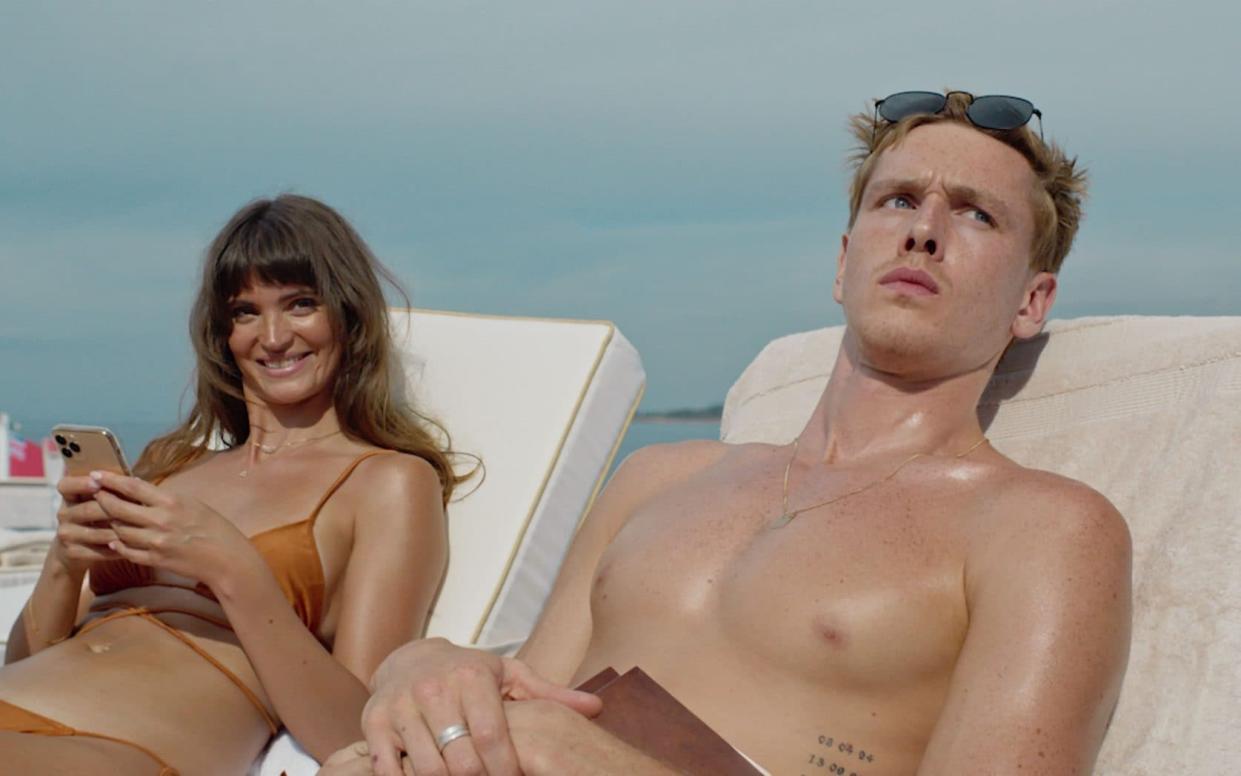Triangle of Sadness, review: Noam Chomsky, oligarchs and projectile vomit

At a catwalk casting session somewhere in Europe, the anxious auditionees ease their nerves with a parlour game. “H&M!” someone shouts, and the shirtless chaps adopt affable stances and warm, welcoming grins. Then comes another cry – “Balenciaga!” – and they all instantly shift into slouching disdain. “As the clothes get more expensive, you have to look down on the consumer,” a video blogger explains. Meanwhile, the mood in the room continues to shift back and forth: anguished one moment, and upbeat the next.
If you’ve ever seen a Ruben Östlund film, you’ll know the feeling. The Swedish provocateur, whose art-world satire The Square won the Palme d’Or at Cannes in 2017, is a master of a very Scandinavian strain of distraught comedy, in which self-absorbed characters are tortured by an impish cosmos, and permission to laugh is never explicitly granted.
It's a style that was very well received at Cannes: his new film Triangle of Sadness was awarded the Palme d'Or in 2022, five years after his previous feature, The Square, did the same. That puts Östlund in the festival's elite circle of double winners, alongside the likes of Francis Ford Coppola, Michael Haneke and Ken Loach. There's no question he deserves to be there. Triangle of Sadness was easily one of the most talked (and argued) about titles at this year's festival: when it premiered, it slipped a whoopee cushion underneath the dreary and staid competition strand.
Its title refers to the area on the forehead from which worry lines emerge – and the ones belonging to Carl (Harris Dickinson) and Yaya (Charlbi Dean) are about to receive a rigorous workout. Two fashion models trying to launch themselves as a glamorous influencer couple, they accept a free cabin on a luxury yacht cruise in exchange for a steady stream of preening social media posts. Carl, whose profile is already waning, usually finds himself behind the camera, snapping his sort-of-girlfriend basking on the sundeck or in the formal dining area, dangling perfect spaghetti over her mouth. (Eat the stuff? Of course not: she doesn’t do gluten.)
Among this vapid pair’s fellow passengers are a Russian oligarch (Zlatko Buric) who made his fortune in manure, a Swedish tech billionaire (Henrik Dorsin), a retired English couple who made their fortune in land mines and hand grenades, along with various mistresses and trophy wives. When one of these nightmares (Sunnyi Melles) demands the entire crew down tools and take a swimming break, it’s a power play disguised as a kindly gesture. But it’s also a very bad idea when raw seafood is on the menu, and the ingredients for the evening’s formal dinner end up sitting in the tropical heat for at least half an hour longer than they should. Worse still, a typhoon is blowing in, they’re entering pirate-infested waters, and the captain (Woody Harrelson) is a self-loathing Marxist who gets drunk and reads Noam Chomsky over the intercom. In short, it’s going to be a meal its survivors will not soon forget.
Östlund conducts the central dinner scene as a symphony of panic, rancour and projectile vomit and diarrhoea: it’s art-house gross-out at its most stomach-clutchingly puerile, and I’m not ashamed to say I roared with laughter throughout. It also prompted some walkouts, which are of course the hallmark of every great Cannes film: even at the press preview, I heard a handful of abandoned seats click upright - whether this was due to its ample length or suggested disapproval at the more 'explosive' moments, I wasn't clear.
Satire isn't quite the right term here: Östlund isn’t interested in subverting the social order on this fraught little vessel so much as inverting it, and the meal becomes the pivot point in a carnivalesque upending of the rules. Soon we’re in borderline Lord of the Flies territory, where Filipina toilet attendant Abigail (Dolly De Leon) discovers her survival skills are of rather more use to the group than, say, Carl’s – though she’ll find a use for this hunky young thing, don’t you worry about that.
The points of Östlund’s Triangle are far from subtle. Vanity is toxic; fortunes corrupt; everyone loves to see an Instagrammer getting their comeuppance. But across its well-earned two-and-a-half-hour running time, epic schadenfreude keeps edging into genuine sympathy, and we feel just sorry enough for these awful people for the next humiliation to sting just as hard. The 25-year-old London-born Dickinson doesn’t give Carl depth so much as suggest he’d desperately like some – the kind of performance detail which elevates the characters here from stereotypes into agonisingly plausible individuals.
Even so, Östlund knows sometimes a well-turned gag is all that’s required. Who could resist a film in which a sweet old lady watches a live grenade roll down the deck and come to a rest against her foot, then turns to her husband and says: “Look, dear, it’s one of ours”?
15 cert; 150 min. In cinemas now


